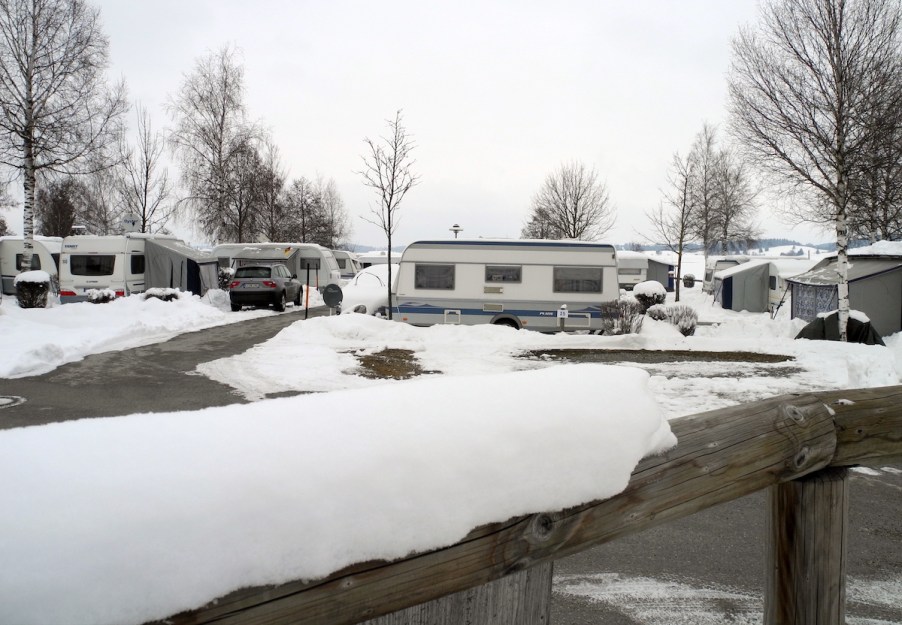
12 Pro Tips for Winterizing Your Camper or RV
As the winter months are quickly approaching, ensuring your camper or RV is ready for temperatures below freezing is vital. Every winter, hundreds of campers and RVs end up taking damage due to owners forgetting to properly winterize their “home away from home.” Here are 12 pro tips that can save you a ton of money and heartache as the temperature drops below freezing!
1. Clean your entire RV or camper

While it is easy to get home from a long, arduous trip and immediately park your RV without doing a complete cleaning, this can lead to a ton of issues down the road. Make sure you deep clean your RV before you park it for the winter.
This includes all linen and carpet as well. A sparkly-clean RV or camper makes taking it out in the spring that much more exciting!
2. Plumbing and antifreeze
According to RV Geeks, one of the most important but easily forgotten aspects of winterizing your RV or camper is protecting against bursting pipes in freezing weather. Ensure you drain out all water sources in your unit and add some antifreeze to your plumbing. Antifreeze is a cheap solution that works as a failsafe against any water that may be missed while draining all plumbing.
3. Humidity and moisture control
Before you close up your RV for the winter, make sure you have a humidity or moisture-wicking device in your vehicle. One example of this device is DampRid, which uses calcium chloride to wick moisture from the air, keeping your RV from getting mold or mildew inside.
4. Winterize the refrigerator when winterizing your camper
According to RV travel, you want to make sure your refrigerator is fully clean and clear, and for some extra protection against moisture, add a box of baking soda to absorb any excess moisture. For additional protection, prop your fridge open, and clean it well.
5. Prep for pests
Pests of all types look to hide wherever humans aren’t. An RV sitting idle all winter is bound to attract pests. Make sure your RV is completely clean and clear of anything that may attract pests, and if your vehicle has any gaps in the doors or any other easy ways in, block these entrances.
6. Remove your batteries
To ensure your batteries are ready for the next season, disconnect them and take them out of your vehicle. These can be stored indoors and put on a battery tender to ensure they are ready for the spring.
7. Wash your washer
If your RV has a washer, put it on a small load or self-cleaning cycle. Then prop open the washer door and soak up any excess moisture with a towel.
8. Turn off your propane tank when winterizing your camper
This is an easy one to do but also an easy one to forget. Make sure your propane tank is completely shut off. The last thing you want in your RV is a gas leak!
9. Water heater protection
An easily forgotten but crucial step in winterizing your rig is draining your water heater. Under freezing temperatures, having water in your water heater can lead to a destroyed water heater. Be sure to drain and turn on your bypass valves!
10. Make repairs
It is easy to want to put off making minor repairs to your RV, but checking for small repairs and performing them before putting your RV or camper into storage means that your unit is all ready to go when the weather gets better in the spring.
11. Pull down the shades when winterizing your camper
To ensure your RV’s linens and fabrics don’t fade in the sun, make sure you pull the sunshades on your RV entirely down. This also keeps would-be thieves from seeing anything worth stealing.
12. Cover your RV
Finally, cover up your RV once everything is checked, performed, and finished. Make sure to use a true RV cover made from breathable material. Do not use a tarp! Tarps do not let water or air in or out of the RV and could lead to trapped moisture if anything gets in!
Follow these pro tips, and you are bound to have an RV that is winterized and ready for adventures in the spring.



